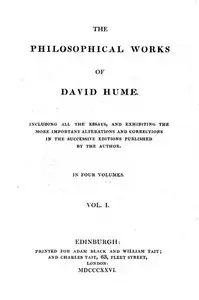"A Treatise of Human Nature" by David Hume is a philosophical work written in the early 18th century. This text introduces Hume's empirical approach to understanding human psychology, morality, and epistemology, emphasizing the experimental method applied to moral subjects. The treatise explores fundamental questions about human cognition, perception, and the nature of causation, striving to elucidate the mechanisms underpinning human thought and behavior. The beginning of this philosophical exploration sets up Hume's ambition to integrate the experimental method into the analysis of human nature, contrasting with traditional speculative approaches. The opening consists of introductions to the first two books, providing insights into Hume's critique of previous philosophical ideas, notably those of John Locke. Hume's examination aims to dissect the foundations of knowledge, questioning the reliability of impressions and ideas and laying the groundwork for his radical skepticism, ultimately challenging the very essence of what it means to know and understand the world. (This is an automatically generated summary.)

A Treatise of Human Nature Being an Attempt to Introduce the Experimental Method Into Moral Subjects; and Dialogues Concerning Natural Religion
By David Hume
"A Treatise of Human Nature" by David Hume is a philosophical work written in the early 18th century. This text introduces Hume's empirical approach t...
David Hume was a Scottish philosopher, historian, economist, and essayist who was best known for his highly influential system of empiricism, philosophical scepticism and metaphysical naturalism. Beginning with A Treatise of Human Nature (1739–40), Hume strove to create a naturalistic science of man that examined the psychological basis of human nature. Hume followed John Locke in rejecting the existence of innate ideas, concluding that all human knowledge derives solely from experience. This places him with Francis Bacon, Thomas Hobbes, John Locke, and George Berkeley as an empiricist.


















